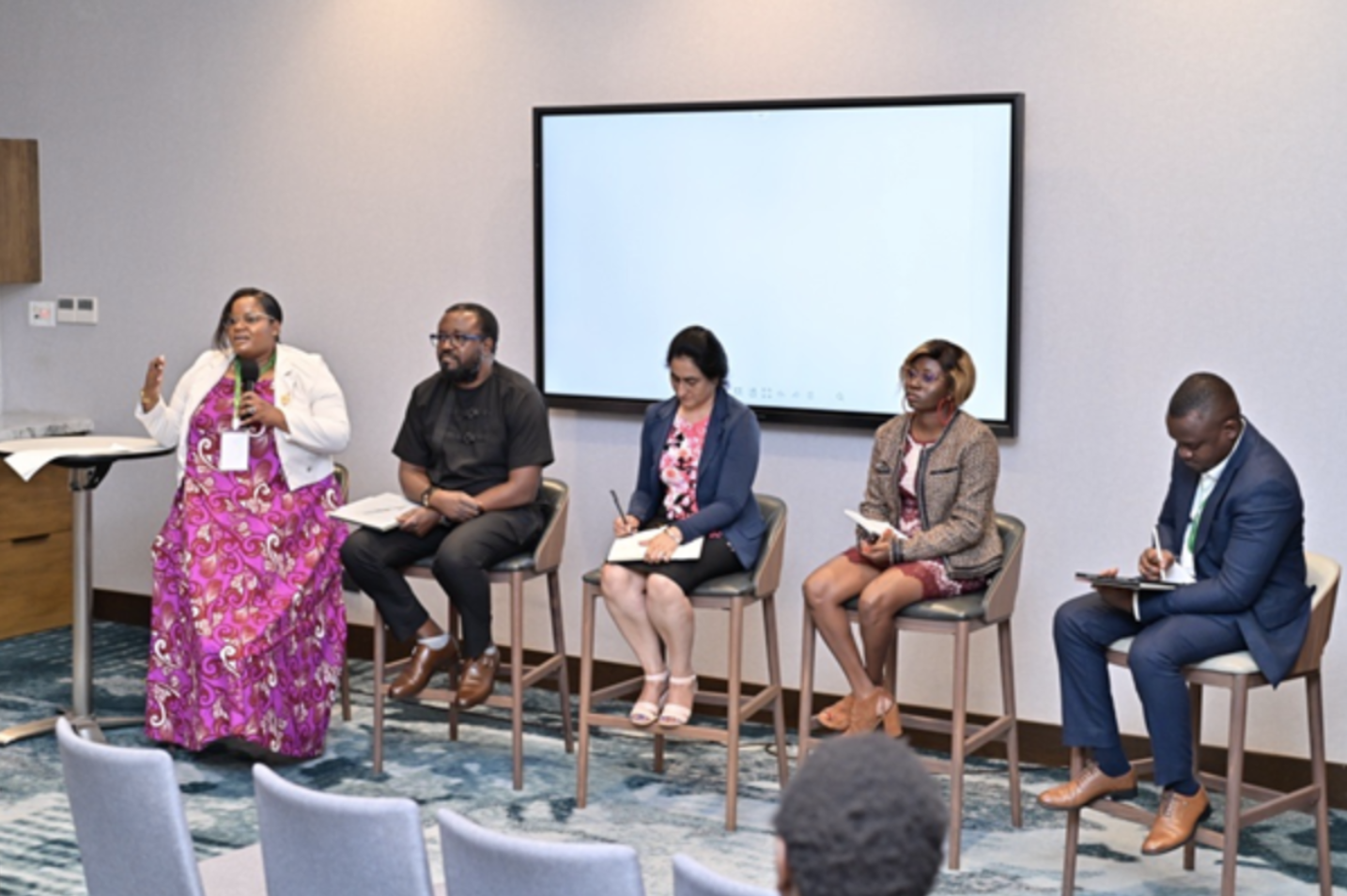
Impact Stories
How GFGP has helped a prominent African research organisation and its partners to strengthen governance practices
Monday, August 28, 2023

By Joseph Gichuru, Janet Moraa and Edward Abira
The African Population and Health Research Center (APHRC), a prominent African research organisation, dedicated to improving the health and well-being of Africans through research, has been part of the Good Financial Grant Practice journey since the beginning of the project. In 2019, APHRC embraced the GFGP tool to carry out in-depth due diligence and identify capacity gaps in its programmes, and build capacity. Having participated in the introduction of the GFGP tool, we understood well the benefits of adopting it. In addition, we lead, collaborate, and partner with several institutions and viewed the adoption of GFGP as an opportunity to lead by example: “walking the talk” by assuming an early-adopter position. While we were advocating for the adoption of GFGP, we had to be certified first for us to lead our partners and collaborators.
How the APHRC uses the GFGP tool
To date, four of the Center’s large programmes have used GFGP to assess potential partners for the Consortium for Advanced Research Training in Africa (CARTA), the Immunization and Advocacy Initiative (IAI), Joint Programming Initiative on Antimicrobial Resistance (JPIAMR) and Gates-Catalyze Impact. Over 50 partners in these programmes have carried out pre-certification assessments and a few are working towards certification.
APHRC adopted GFGP to standardise grantee assessments and eliminate duplications, which are expensive in terms of time and resources. Once partners carry out a self-assessment, the APHRC engages certified auditors to conduct a desktop review to identify gaps and to develop tailored capacity-strengthening programmes for them. Given the different levels in the standard, this has allowed APHRC to deal with grantees at different levels with ease. The outsourcing of desk top reviews has drastically reduced the time spent by the Center on the due diligence process. Most importantly, the GFGP assessments have enabled the identification of the capacity-building gaps for APHRC partners.
In 2019, when APHRC made the decision to adopt GFGP, a coordinator was appointed to lead the implementation of GFGP, appointing internal teams to respond to the questions in the areas of their expertise. After the pre-certification phase, the Center engaged the services of the accredited certification firm (PricewaterhouseCoopers) in June 2021 through a competitive bid to audit the APHRC to assess compliance with GFGP. The certification process began in July 2021; APHRC received the final report in January 2022, identifying minor issues to be addressed to earn certification.
In June 2022, APHRC was audited and certified at the Platinum Tier, which is the highest tier. Their GFGP Certification is valid for three years.
Major funders recognise GFGP and are working with APHRC to ensure that best practices have cascaded down to the collaborators and partner institutions of APHRC, including the Swedish International Development Cooperation Agency (Sida), the SFA Foundation through the Developing Excellence in Leadership, Training, and Science in Africa (DELTAS Africa II) award), Bill and Melinda Gates Foundation (BMGF) and the International Development Research Centre (IDRC). Some of the funders that we work with, (SIDA, BMGF, IDRC) who are new to GFGP, easily accept to allow for GFGP-related costs in grants as they appreciate its value in thorough due diligence and as a tool to illuminate areas that need strengthening.
How APHRC earned its platinum certification
To earn GFGP certification, the APHRC was required to develop some new policies in operations and to strengthen some areas in the existing policies. Specific guidelines were developed for the improvement of the finance manual, gift policy, and proper documentation of certain processes. In addition, the tool highlighted the need to separate finance, risk, and audit resulting in an additional Board committee, the Audit Committee, which was constituted and operationalised.
How GFGP certification has benefitted the APHRC and its partners
The certification at the platinum level improved APHRC competitiveness as funders recognise the quality associated with having earned the highest level of GFGP certification. This assures funders that APHRC has effectively adopted best practices and is also positioned to guide partners accordingly. The tool’s guide on governance best practices has enabled APHRC to strengthen its governance practices.
To date, 82 APHRC partner organizations have carried out the GFGP pre-certification self-assessment while 24 out of these have been reviewed by the outsourced service provider. The aim of this process was to identify strengths, gaps and capacity-strengthening needs in research grants management within partner organisations. Pre-certification assessment exercise enhanced partner organisation's accountability, integrity and efficiency in managing research grants and fostered the partner’s compliance with external funding requirements,
What the APHRC has learnt from using the standard
- Most institutions haven’t documented operating processes and policies, making self-assessment difficult. Therefore, we cannot stress enough the importance of ensuring that the processes and procedures are fully documented.
- Knowing where one falls from bronze, silver, gold, and platinum is a great motivation to improve even without any capacity-strengthening programme. Just as with any ranking system, one feels the need to move up the ladder. We have seen some of our partners get very energized in improving their systems once they carry out the GFGP assessments.
- As with any change, resistance is to be expected. Some feel that GFGP is quite rigorous, preferring the status quo. Developing the missing policies and procedures requires collaboration among departments within an institution to share the load and ensure that the organisation achieves the best practices in the industry.
- The cost of undertaking assessment may not be budgeted by institutions. We encourage institutions to include the GFGP certification costs in their project budgets when applying for funding. This will help them to cater for the GFGP certification costs whose benefits outweigh the investment of undertaking the process.
- Organisations that already have a buy-in should continue sensitising and influencing their peers and collaborators to get the GFGP certification as awareness of the tool is still growing.
Overall, GFGP is a valuable tool that can help institutions improve their management and governance of grant funding and enable them to attract more resources. By implementing GFGP, institutions can increase the confidence of grantors in their ability to manage grant funding effectively, improve their financial reporting, reduce costs, and increase efficiency. We strongly encourage organisations to undertake the GFGP certification as it is the future of the grantor–grantee community and the benefits of the rigorous process outweigh the implementation challenges.
About the Good Financial Grant Practice
The Good Financial Grant Practice (GFGP) Standard is the world’s first international standard in grant management, developed through extensive consultation with grantees from across Africa and with support from some of the world’s largest public and private sector funders. The tool was introduced to enhance the governance of grant funding and management globally. Organisations complete a pre-certification assessment to determine the steps needed for them to meet the GFGP Standard. Based on the assessment organizations complete the steps required for compliance to attain certification at the GFGP Standard.
The unique strength of GFGP is its capability to identify institutional gaps for capacity building. Additionally, the GFGP process is tailored to the needs of individual organizations, thereby allowing institutions to assess themselves at four levels; bronze, silver, gold, and platinum.
The GFGP Standard covers four key areas: Financial Management, Procurement, Human resources, and Governance. Benefits of achieving GFGP certification include: internationally accredited validation of trust and accountability; assurance to funders that an organisation provides governance of their funds at the highest standards; and oganisations strengthen their grants management capabilities.
The Science for Africa Foundation (SFA Foundation) recognises the Good Financial Grant Practice (GFGP) Standard as a pivotal instrument for enhancing the operational efficiency of partner organizations, and a contributor to strengthening the scientific research ecosystem in Africa for a better future in a global world.
The SFA Foundation is committed to promoting the widespread use of the GFGP Standard. The Standard is not limited by geography and can be adapted to meet the needs of organizations of all sizes, including grantors and grantees. The SFA is unwavering in its dedication to ensuring that robust governance and accountability are cultivated within the grant funding ecosystem.
The GFGP Standard is a valuable tool that can help grant-funded organisations improve their effectiveness. The standard provides a clear framework for organisations to assess their own capacity and identify areas for improvement. It also plays an important role in strengthening the scientific research ecosystem in Africa and beyond.
About the Authors
- Dr Joseph Gichuru Wang'ombe is the Deputy Executive Director and head of the Operations Division at the Africa Population & Health Research Center (APHRC).
- Janet Moraa is the Assistant Finance Manager in charge of financial management of the Research Capacity Strengthening division at the Africa Population & Health Research Center (APHRC).
- Edward Abira is a Programme Officer working for the Good Financial Grant Practice (GFGP) Programme at the SFA Foundation.



